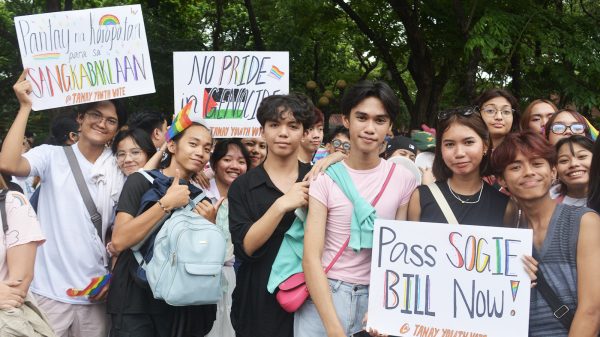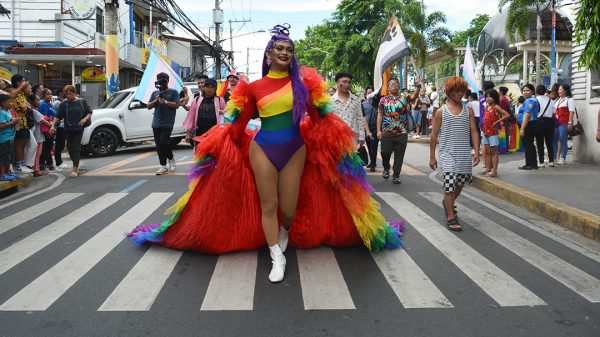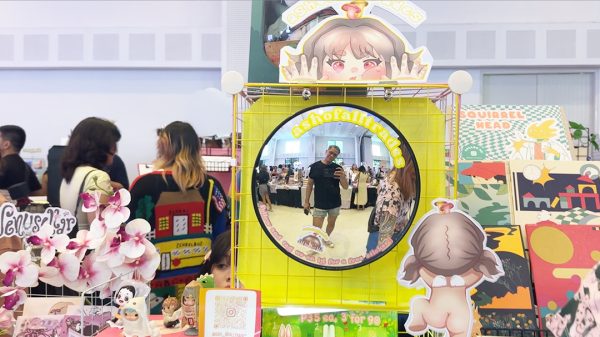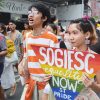I’ve always felt that I was born in the wrong country.
Not because I lack certain sensibilities of being Filipino, and all that comes with it. I have, on more than one occasion proved to be so textbook Filipino, that I succumbed to the temptation of buying cheap-ass goods and having them shipped home from the US in a large cardboard box. NOTHING (and I say this with the appropriate hand gesture), NOTHING is more Pinoy than a “Balikbayan Box” stuffed full of rolls of paper towels from Costco.
It’s not because of that. It’s because I’m a fat gay guy, with a beard.
Such is the dilemma of a young, Pinoy, gay boy, growing up in suburban Metro Manila in the ’90s. To be sure, mine was like any other, middle-class upbringing, largely gone unnoticed in the middle of a poverty-centric country. By poverty-centric, I mean a society that’s preoccupied with gawping at the misery and squalor of those whose lives have taken a dive, without actually doing anything about it. This was apparent in the public’s fascination with poverty-porn in cinemas and television: of “poor” characters smiling and making the best of their circumstances, usually culminating with a dance number with the whole cast on a beach somewhere. This fixation spilled over to social perceptions on the subject of weight: especially among the mothers and their respective children. The logic is beautiful in its simplicity, really: Fat kids means healthy kids. The pursuit of children who have “healthy appetites” became the all-consuming objective of mothers all over the country, without actually drawing the line as to where “healthy appetites” became, well, overeating.
I was not immune to this, and being naturally thin, I was given every imaginable food supplement my physiology can handle. It’s so very easy to down another couple of pills when they’re made to look like cartoon characters, their smiles echoing the smiles of approval from parents who comment on how wonderful and how precious you looked now that you gained a little more weight. So you take two more, to slow down your metabolism just a little bit more. And it’s so easy to adopt the same standard of beauty: images of chubby kids running around would occupy my days, and believing that the world is full of rainbows and anthropomorphic woodland creatures. You start looking at the world based on the same standard, where thin people are ugly, and heavyset people are pretty. Your attention is drawn to those who looked like your ideal, and you identify with them.
Through the years, and all throughout the formation of your sexual identity, this is carried over: how your brain perceives certain people to be attractive is defined by your ideal. Somewhere along the line though, for people like myself, at least, something causes you to go against type. Some part of you rejects the prevailing, manufactured ideal standard of beauty. Whether this is caused by a strong, overarching desire for a “sameness” with what you perceive as beautiful in yourself, or a strong urge to go against the flow of the rest of contemporary gay Manila, I am not sure; but this feeling is all too real, and has become the basis of many a gay bear who accepted themselves as such.
A Bear, by loose, popular, definition is a gay man who would be a little on the heavy side, with some form of facial hair, and some amount of body hair. And like its ursine namesake, the Bear is drawn towards more rugged, less prissy pursuits. At least, that’s the western definition. It is a subculture born out of the AIDS scare during the 1980s, where men who did not fit the mold of the slim, circuit kid, Castro clone variety, gained attention because of the perception that they are “healthier”, manifesting no outward trace of the weight loss so closely attributed to the disease. The movement has since grown into a global subculture with its own brand. I gradually learned more and more about them through a very expensive (and a VERY slow) dial-up connection in the darkness of my room.
This presents a problem when you live in a country like the Philippines. I have made this argument countless times over: Why are there so few bears here, when we are more genetically predisposed to have them than the rest of Asia? Even Thailand has a bear bar! I would go to every hot, gay event and end up sticking out like a sore thumb because: a) I am fat, b) I have a beard, and c) I actually enjoyed drinking beer. That’s how it was in the late 1990s to early 2000s; prior to the democratization of the Internet, before smartphones with Grindr, Growlr, and Scruff on ‘em. At times you start to wonder if you are the only one, even if simple mathematical probability tells you that you aren’t. You sit at home and you read about Bear Busts and Bear Runs, and clubs in every imaginable city but your own. And you start to feel lonely. And you start to want.
But want what exactly?
I have since grown from that small boy into a (not so small) Bear. I felt that upon hitting thirty, I have passed that threshold. And while attitudes are changing towards what it means to be gay in a world constantly at odds with itself, a world that’s getting smaller and smaller everyday; it still boils down to a basic human need for community, for a sense of belonging. We all want a group of people who believe and understand that wanting to be with someone who does not fit the ideal is okay. We want to break in some insular circle of like-minded individuals because it’s easier to relate to them. We want to be acknowledged. We want to be accepted.
Easier said than done in this life, but it is what we strive to gain.
We want to belong.


























































